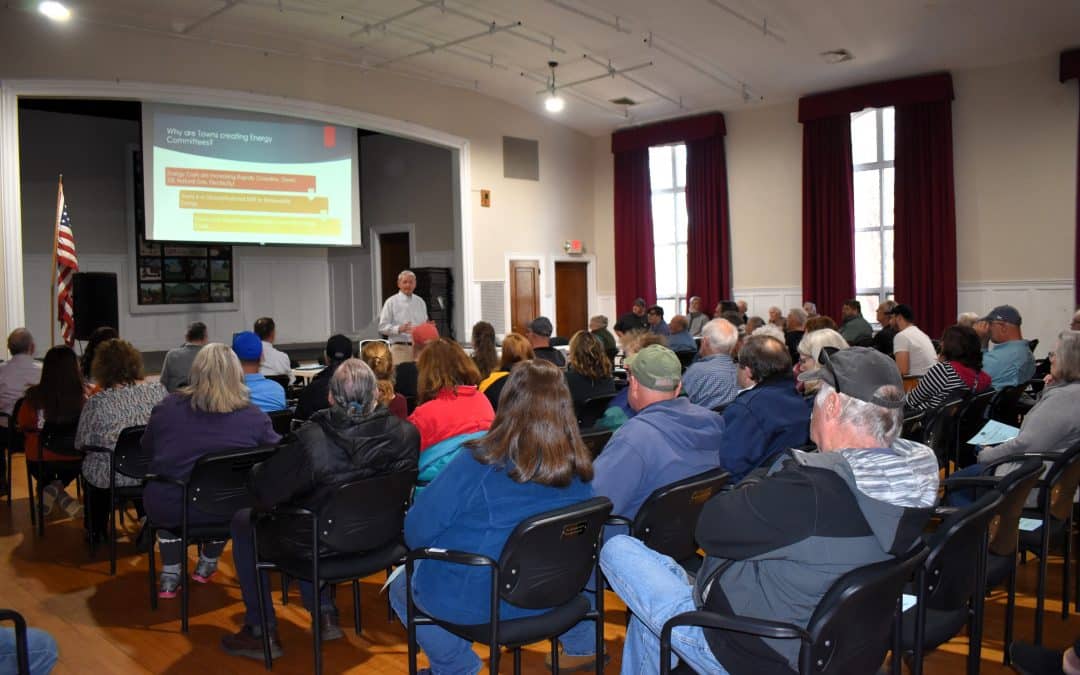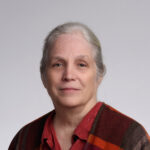Andy Myers, chair of the Chester Energy Committee, addresses residents in a meeting about the potential sale of the Chester Municipal Electric Light Department to Eversource.
Reminder Publishing photo by Amy Porter
CHESTER — At an informational meeting on April 22, residents heard from Eversource why they should sell the Chester Municipal Electric Light Department to them. Earlier in the month, CMELD had given a presentation on why the electric utility should remain town-owned. Both presentations are posted at townofchester.net.
Chester Selectboard Chair John Baldasaro said that there will be more meetings to follow. He said in order for a sale to move forward, it would have to pass a two-thirds majority vote at two town meetings, six months apart. Also on the committee are Nick Chiusano, Bob Daley, Rich Holzman and Ed Sourdiffe.
The April 22 session began with an introduction by Andy Myers, chair of the town’s Energy Committee, formed by a Town Meeting vote in June 2023 to look at the rising costs of energy and ways that the town could shift to renewable energy.
Myers said in 2018, the state set a minimum standard for utilities to procure their electricity from clean energy sources, beginning at 16% that year, and increasing 2% annually to 50% in 2030. He said clean energy is more expensive, and costs are expected to continue to rise.
With Eversource, residents would have an option to connect to an alternative energy supplier. The company offers incentives for solar energy, and rebates for qualifying energy efficient equipment through MassSave for items such as heat pumps, smart thermostats and whole-home energy audits. The town could also choose to participate in a municipal aggregation with a competing energy supplier, as Huntington currently does, which residents can opt to join or leave.
At a meeting of the Energy Committee in October, Myers said that CMELD is not as competitive as Eversource in residential solar. CMELD pays 4.8 cents per kilowatt-hour for solar net energy, versus Eversource, which pays 23.9 cents.
Building Inspector Jason Forgue, who serves six nearby towns as an inspector, said at the same meeting that the number of solar permits being granted is significant in every town but Chester, where residents are not getting that benefit. All of Chester’s abutting towns are served by Eversource.
For CMELD, potential investments would be in solar expansion, residential solar incentives, wind power and battery storage technology. The town received $130,000 in Green Communities funds, and invested $88,000 on solar panels on the town garage and fire station that are saving 25% to 30% percent in electricity spending on those buildings, among other energy-saving work.
According to its presentation earlier in the month, CMELD currently sources 33% of its power supply from non-emitting producers that meet the state’s clean energy standard, through its participation in Energy New England’s Broadleaf Solar and Great River Hydro projects.
Myers said CMELD’s rates at 23 cents per kilowatt-hour are lower than that of Eversource, but not as low as most municipally owned departments, due to its smaller size and the economies of scale. According to the CMELD presentation, its power supply costs are half of Eversource rates, and its rates are historically 20% to 40% percent lower than the for-profit utility.
Eversource’s bills are divided into separate charges for supply, transmission, distribution and public policy, and presenters did not give a rate that could be compared to CMELD rates. One resident at the meeting said it would be nice to have a handout that shows each of the components, and both Eversource and CMELD representatives agreed to provide such a comparison at a future meeting.
Myers said another advantage to the sale is that the electric power infrastructure in town would become taxable property, yielding $30,000 to $40,000 a year to the town, as Eversource is a for-profit company and CMELD is tax-exempt as a nonprofit. In an earlier presentation, Myers said CMELD does contribute back to the town in lieu of taxes, paying about 2% of its annual revenue.
A resident said people are interested in participating in MassSave, and asked how much participating in it would increase CMELD’s bill. CMELD Commissioner Deryck Savoy said municipal plants cannot participate in MassSave.
“I think it’s wrong because there is state money in play,” he said.
Myers said Chester is an island surrounded by Eversource customers, and has 40 households on the Eversource grid supplied from Worthington. This is one of the reasons stated by the Eversource representatives for their interest in purchasing CMELD.
He said the objective of the Energy Committee is to present options.
“It’s all about education,” he said, declining when asked to give his personal recommendation as to which way the town should go.
Aimee Henderson, Eversource’s community relations specialist for Western Massachusetts, said the company is the largest energy delivery company in New England, serving one million customers. She said the company’s vision is to be carbon-neutral by 2030.
Eversource is regulated and licensed by the Massachusetts Department of Public Utilities. Henderson said it was ranked number one in utility customer care by Power Residential Studies, and was the Energy Star Partner of the Year in 2023.
Henderson noted that during a storm, her role shifts to being a liaison for emergency response, working 14-hour shifts to ensure public safety and the restoration or continued delivery of power to essential services. But one resident at the meeting commented that during a storm, there would be communities in Eversource’s territory with a lot more people than Chester, and they would presumably take priority.
Paul Renaud, Eversource’s vice president of distribution engineering, said his team does the groundwork to avoid outages.
“Our primary goal is reliability,” keeping the lights on and the system intact, he said. He said a team goes out in the storms, and checks back after storms. With the weather getting more harsh, he said they are focused on storm events.
When asked how long it would take a crew to get to Chester, Renaud said the average interruption time, not in a storm, is 103 minutes. He said 90% of outages are due to vegetation.
“During blue skies, the average customer outage is once every 21 months,” he said.
A question of whether averages come from large numbers of customers in densely populated areas was followed up by another asking what do averages mean to rural communities.
Renaud said Eversource crews trim trees on a four-year cycle, with a focus on the largest customer blocks first. He said the company has 200 active crews and troubleshooters, which during a storm can increase to 2,000 crews, depending on the size of the storm.
He said smaller towns and smaller outages do tend to be addressed at the end of a storm, a point also made during the CMELD presentation earlier in the month, which said with no local crews, Eversource directs resources to denser population centers first, then rural areas.
According to its presentation, all of the CMELD employees and crews are located in Chester, which is their sole focus during a storm. CMELD also maintains an office in Town Hall where members of the community can go to pay a bill, ask a question or receive general assistance, as opposed to Eversource, which does not have any public offices, so all transactions are online or by telephone.
Other comments and questions that were raised, some unanswered, asked how CMELD could afford to replace infrastructure in the future; whether CMELD staff would be retained if the sale went through, to which Eversource representatives said they would make them an offer, and whether Eversource had done a preassessment of the electric grid in Chester.
An initial offer by Eversource of $203,000 for the CMELD infrastructure had been mentioned at the meeting.
Baldasaro said it was too soon to discuss some of the issues raised, and the next steps would be to have a legitimate proposal by Eversource on the table, followed by more public meetings.
Baldasaro urged residents to do some research and inform themselves.
“This is one of the biggest decisions Chester has made,” he said, adding that he would also not be giving his opinion as to which way the town should vote.


